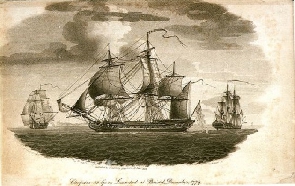 Photos of Sir Winniett have been lost online
Photos of Sir Winniett have been lost online
Sir William Robert Wolseley Winniett was a governor in the Gold Coast but worked tirelessly to end the trade of slaves. Serving under the Governor of Sierra Leone, Winniett became the lieutenant governor of the Gold Coast (now Ghana) on October 24, 1845. Determined to abolish the Slave Trade, he went to the capital of Abomey (current Benin) in 1847 after the Slave Trade Act outlawed the slave trade in the British Empire in 1807 and the Slavery Abolition Act of 1833 outlawed slavery altogether. According to details available online, in 1848, Sir William Winniett led the West India Regiments and others to stop the murdering of Africans and Europeans by deposing Kaku Aka, the king of Amanahia (Apollonia). That same year, with his secretary, Thomas Birch Freeman, he went to the Kingdom of Ashanti to persuade Ghezo, the King of Dahomey, also known as King Kwaku Dua, to stop the slave trade and abolish human sacrifice. Details by Wikipedia show that at the time, the king was in the business of exporting 8,000 slaves a year. He also purchased Dutch fortresses on the Slave Coast to end the Dutch slave trade. On June 29, 1849, Sir. Winniett was knighted by Queen Victoria at the Buckingham Palace. He died on December 4, 1850, at Jamestown/Usshertown, Accra and was interred in the cemetery at Fort Christiansborg (Ebenezer Presbyterian Church, Osu). Watch the latest episode of People&Places on GhanaWeb TV below:
Sir William Robert Wolseley Winniett was a governor in the Gold Coast but worked tirelessly to end the trade of slaves. Serving under the Governor of Sierra Leone, Winniett became the lieutenant governor of the Gold Coast (now Ghana) on October 24, 1845. Determined to abolish the Slave Trade, he went to the capital of Abomey (current Benin) in 1847 after the Slave Trade Act outlawed the slave trade in the British Empire in 1807 and the Slavery Abolition Act of 1833 outlawed slavery altogether. According to details available online, in 1848, Sir William Winniett led the West India Regiments and others to stop the murdering of Africans and Europeans by deposing Kaku Aka, the king of Amanahia (Apollonia). That same year, with his secretary, Thomas Birch Freeman, he went to the Kingdom of Ashanti to persuade Ghezo, the King of Dahomey, also known as King Kwaku Dua, to stop the slave trade and abolish human sacrifice. Details by Wikipedia show that at the time, the king was in the business of exporting 8,000 slaves a year. He also purchased Dutch fortresses on the Slave Coast to end the Dutch slave trade. On June 29, 1849, Sir. Winniett was knighted by Queen Victoria at the Buckingham Palace. He died on December 4, 1850, at Jamestown/Usshertown, Accra and was interred in the cemetery at Fort Christiansborg (Ebenezer Presbyterian Church, Osu). Watch the latest episode of People&Places on GhanaWeb TV below: